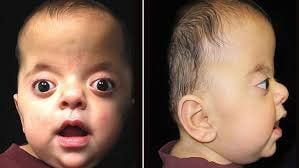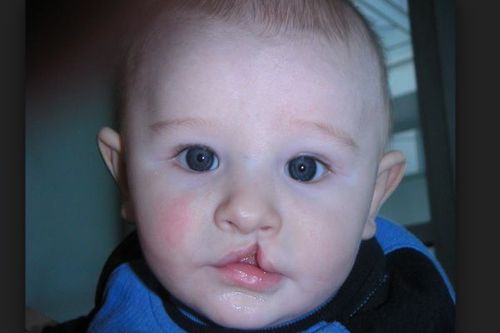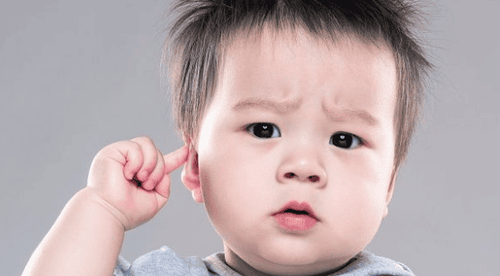This is an automatically translated article.
The article was consulted with Master, Doctor Doan Ngoc Quynh Tram - Pediatrician - Neonatologist - Department of Pediatrics - Neonatology - Vinmec Nha Trang International General Hospital.There are many reasons why children are born deaf or dumb. However, there are many reasons why a child may be born deaf or become deaf in childhood. But it is not always possible to determine the cause of the condition. Sometimes it is necessary to do some tests to try to find the cause of congenital deafness in a child, however will only be able to determine the cause in 40–50% of children with congenital deafness.
1. What is congenital deafness?
Congenital deafness - hearing loss at birth occurs when the ear's ability to convert the vibrational mechanical energy of sound into the electrical energy of nerve impulses is impaired.Hearing loss is classified according to the location of the damage, specifically:
Conductive hearing loss: the outer or middle ear is affected. In conductive hearing loss, sound waves cannot travel through the ear, which may be secondary to underdevelopment of the middle ear, outer ear, or both, or to transient obstruction of the middle ear due to effusion (as in cases of otitis media). Sensorineural hearing loss: The inner ear, auditory nerve, or central auditory pathway are affected. Sensorineural hearing loss can be further subdivided into sensory hearing loss (when hair cells are affected), central hearing loss when the cause lies along the central auditory tract, or a spectrum disorder. auditory nerve. Mixed hearing loss is defined as conductive and sensorineural hearing loss. SEE ALSO: Warning signs of children with hearing problems

2. Why are children born deaf?
2.1. Causes of deafness before birth Most children with hearing loss and hearing loss are due to genetic factors, most commonly a defect in a gene. These defects can have different genetic modes and different morbidity rates.Unsyndromic recessive hearing loss accounts for 80% of hereditary cases, usually congenital, while autosomal dominant nonsyndromic hearing loss accounts for the remaining 20%.
Although the frequency of causative genes varies between populations and ethnicities, the most common genetic cause of non-syndromic hearing loss ranging from recessive to profound is mutation in the beta 2 gene of the gap junction protein (GJB2). Mutations in this gene account for ≤50% of nonsyndromic recessive hearing loss in Caucasians in Europe and the United States.
Permanent deafness in children is most often hereditary, passed down in families, although there does not appear to be a history of congenital deafness in that family.
Some of the most common syndromes associated with congenital deafness include:
Alport syndrome Branchio-Oto-Renal syndrome (Gross-ear-renal slit syndrome) CHARGE syndrome Crouzon syndrome Down syndrome

Besides, congenital infection is also an important risk factor, in fact congenital cytomegalovirus (CMV) infection is considered the most common non-hereditary cause of sensorineural hearing loss. The virus is spread in body fluids, such as urine, saliva, and blood, and exposure to CMV is most common through sex or contact with the bodily fluids of an infected child. CMV.
SEE ALSO: Will deaf children often be mute?
The risk of congenital hearing loss due to infection may depend largely on socioeconomic status. In countries with prevention strategies such as vaccination or good hygiene practices, the risk of neonatal infection is lower. In countries without rubella vaccination programmes, congenital rubella infection is the leading cause of non-hereditary congenital hearing loss. There are also many drugs, known as ototoxicants, that can damage a baby's hearing system before birth.
Hearing can be affected by a cleft lip or cleft palate, or it can happen on its own and be associated with one of the syndromes listed above.
Different forms of deafness can be associated with otomegaly and ataxia, depending on which part of the ear is not forming or functioning as it should.

Children can get a rare ear disease called cholesteatoma and otosclerosis. Both conditions can occur at any time during childhood, however otosclerosis is more common in adolescents.
Medical experts also say that, in addition to the above causes, sometimes head trauma or exposure to loud noises can also damage a child's hearing system.
2.3. Risk factors for congenital deafness
The American Academy of Pediatrics has identified several risk factors for congenital hearing loss including:
Family history of permanent congenital hearing loss. Newborns need to be hospitalized in intensive care. Medical interventions such as assisted ventilation, intravenous access, and administration of aminoglycosides while in the neonatal intensive care unit increase the likelihood of hearing loss. Hospitalization ≥12 days and history of treatment with high-frequency mechanical ventilation were also identified as independent risk factors for hearing loss in this population. Congenital deafness or hearing loss seriously affects a child's health, physical and psychological well-being. Accordingly, the early detection of hearing problems in children with problems will provide a better opportunity for treatment and early improvement methods for children. Therefore, when parents see that their child is slow compared to his peers, and at the same time has signs of congenital deafness, it is necessary to take the child to be examined and screened for congenital deafness as soon as possible. In the long run, being born deaf will lead to muteness.
With many years of experience in examining and treating diseases in children, now the Pediatrics Department at Vinmec International General Hospital has become one of the major health care centers, capable of examining , screening and treatment of many specialized diseases in children. Therefore, if the child has signs of congenital deafness or hearing problems, parents can take the child to Vinmec International General Hospital for examination and receive support and advice from specialists. department.
Please dial HOTLINE for more information or register for an appointment HERE. Download MyVinmec app to make appointments faster and to manage your bookings easily.
References: ndcs.org.uk, ncbi.nlm.nih.gov













